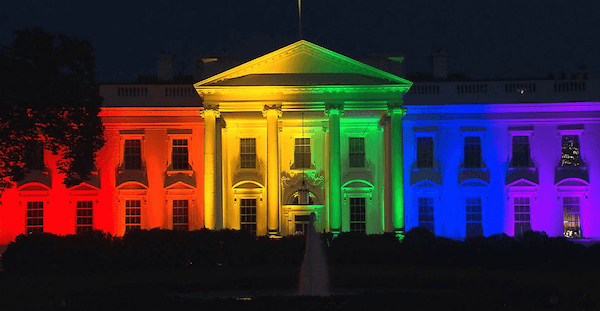Mississippi Republican Governor Phil Bryant, on April 5, signed into law the Protecting Freedom of Conscience From Government Discrimination Act, a measure that received overwhelming approval in both houses of the state legislature.
The law is clearly intended to encourage businesses and individuals in the state to discriminate against same-sex couples, LGBT people, and even sexually active unmarried heterosexuals.
Despite the broad wording of its title, the measure does not on its face protect freedom of conscience in general. Instead, in Section 2, the legislation states that “the sincerely held religious beliefs or moral convictions protected by this act are the belief or conviction that (a) Marriage is or should be recognized as the union of one man and one woman; (b) Sexual relations are properly reserved to such a marriage; and (c) Male (man) or female (woman) refer to an individual’s immutable biological sex as objectively determined by anatomy and genetics at time of birth.”
In the heart of Dixie, measure equal parts symbolic and unconstitutional passes easily
The first of these, of course, defies the Supreme Court’s 2015 ruling in Obergefell v. Hodges that same-sex couples have a constitutional right to marry. The second defies the 2003 sodomy ruling in Lawrence v. Texas, which held that the state may not penalize private sexual relations between consenting adults, regardless of their sex. And the third defies the overwhelming medical consensus that gender identity is a human characteristic that exists apart from biological sex in terms of anatomy and genetics.
The law does not specify how it will be determined that somebody sincerely holds these beliefs rather than merely asserting them opportunistically to avoid liability for mistreating somebody.
The Mississippi law’s provision regarding gender identity takes things one step further than the notorious measure North Carolina enacted last month. In North Carolina, “biological sex” is now defined as the sex indicated on a person’s birth certificate, and since the state allows people to obtain new birth certificates consistent with their gender identity with proof of surgical transition –– though that’s an insurmountable hurdle for many transgender people –– the law there does not treat sex as quite so “immutable” as Mississippi does.
The new Mississippi law protects people who act on their beliefs in a variety of ways. Religious organizations and clergy can refuse to have anything to do with same-sex marriages, a provision that largely codifies First Amendment rights they already enjoy. The law, of course, does not stop there, but instead allows businesses to refuse to provide their goods, services, and accommodations to same-sex couples and to exclude transgender people from the use of single-sex-designated facilities even though they are consistent with their gender identity. Under the law, nobody can be subjected to loss of their tax-exempt status or denial of government contracts or benefits because they have and exercise these “protected” beliefs. People who spout anti-LGBT rhetoric will be protected from adverse consequences as well, even if they articulate those views while working in a government job.
Government employees responsible for authorizing or licensing marriages can seek “recusal” from doing so “based upon or in a manner consistent with a sincerely held religious belief or moral conviction.” They must, however, send a written notice of such recusal to the State Registrar of Vital Records and “take all necessary steps to ensure that the authorization and licensing of any legally valid marriage is not impeded or delayed as a result of any recusal.” This provision is undoubtedly intended to shield the state from liability for refusing to provide a service that same-sex couples have a constitutional right to receive.
Wedding officiants are given an out based on their religious and moral views, but this provision is completely superfluous, since nobody would seriously contend that the government can compel clergy to perform services.
The state of Mississippi is now barred from taking any “discriminatory action” against individuals acting on these beliefs in terms of tax exemption, licensing, certification, accreditation, custody award, or agreement, to name just some of the categories. The list seems based on the variety of cases that have arisen around the country over the past few years in which people have suffered adverse consequences because of their religious objections to homosexuality or same-sex marriage. Some people, for example, have been expelled from graduate counseling programs for refusing to provide non-judgmental counseling to gay clients, and such expulsions would clearly be prohibited by this law. The law would also forbid denying government employment to any candidate based on their holding these religious or moral beliefs.
The practical effect of the new law is to say that married same-sex couples can be denied a host of benefits and entitlements under a variety of programs, in blatant violation of last year’s Supreme Court’s Obergefell marriage equality ruling. In effect, it erects a structure somewhat akin to apartheid around same-sex marriages. Ironically, the measure was enacted just days after a federal district judge in Mississippi ruled that the state’s ban on adoption of children by same-sex married couples violates the 14th Amendment in light of Obergefell.
The measure seems clearly unconstitutional under the First Amendment’s Establishment Clause since it exalts and privileges particular religious beliefs and those who hold them for “special rights.” On the other hand, some of the law is merely symbolic for several reasons. Since neither Mississippi nor any of locality there expressly outlaws discrimination based on sexual orientation or gender identity, denial of goods, services, and accommodations to LGBT people and same-sex couples already carries no penalties under state and local law. At the same time, the US Constitution’s Supremacy Clause means that federal constitutional and statutory rights take priority over state law.
So, for example, under Title IX of the federal Education Amendments Act as interpreted by the Department of Education, educational institutions in Mississippi receiving federal money –– which would be just about all of them –– may not discriminate against transgender individuals because of their gender identity. And both the federal Equal Employment Opportunity Commission and the Justice Department have interpreted Title VII of the Civil Rights Act of 1964 to bar employers in Mississippi from discriminating because of sexual orientation or gender identity. Unfortunately, no federal law codifies this interpretation, which has not been fully embraced by the courts.
And, as a federal court ruled days earlier in the adoption case, state policies denying equal rights and benefits to married same-sex couples can be challenged under the 14th Amendment’s Equal Protection Clause.
The main question now is who will file the first lawsuit to challenge this travesty. Robbie Kaplan, the fearless slayer of the Defense of Marriage Act, the victorious advocate in the Mississippi marriage equality lawsuit, and the plaintiff’s representative in the same-sex parents adoption case there, would be my candidate.



































